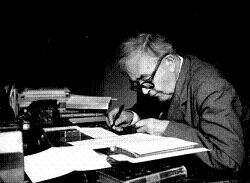
The following is taken from old lecture notes of mine for a course I taught some years back at Cranmer House. This section is based on G.W. Bromily’s discussion in Chapter VII of his Introduction to the Theology of Karl Barth (pp. 84-98).
(1) Barth, like Calvin, understood the divine decree of election as eternal and immutable. However, he rejected outright the notion of election as an abstract decretum absolutum in the traditional Augustinian sense, considering such to be implicitly deistic. Rather the decree of election is God’s eternal (i.e., ever-present and active) will; and his eternal will is Jesus Christ. The will of God is known to us in the revelation of Jesus Christ, who is both the subject and the object of election.
(2) Jesus Christ is both the electing God and the elected Man. As Son of God He, along with the Father and the Holy Spirit, is the subject of election. As Son of Man He is also elected Man – the object of election. However, he is this not merely as one elected man but as the One in whom all others are also elected. His is the all-inclusive election in which we see what election always is: the unmerited acceptance of man by grace.
(3) The eternal will of God in the election of Jesus Christ is the will of God to give Himself in the incarnation of His Son. This self-giving has both a negative and a positive side – thus it is a “double predestination.” Negatively, God elected Himself to be man’s covenant-partner and as such he suffered death, bearing man’s merited rejection. Positively, the divine self-offering means that God elected man in Jesus Christ to be his covenant-partner and thus to be taken up into His glory as His witness and Image-bearer.
(4) Election should not be understood as one form of predestination, with reprobation as the other form. Such a view inevitably leads to some form of double predestination doctrine that works against the free grace of the Gospel. Rather, reprobation is viewed in terms of Christ’s rejection for us that we in turn might not be rejected. It is the negative side of predestination, which, like the positive side, has Christ as both its subject and object. In this may be seen that God’s predestination is his will in action, neither an abstraction from this will nor a static result of it (hence avioding the implicit deistic tendencies of the scholastic theologies).
(5) Divine election is primarily that of Jesus Christ but His election includes the election of man. This does not mean merely the election of individuals. Between Jesus Christ and individuals is the elected community, which in its mediate and mediating roles mirrors the one Mediator, Jesus Christ. It is only through this mediating election, by inclusion in the elect community, that individuals are elected in and with Christ’s election.
(6) The gospel declares that the individual is already elected in Jesus Christ, who bore his merited rejection. The individual begins to live as elected by the event and decision of receiving the promise. If he does not receive it, he lives as one rejected in spite of his election. If he does receive it, he now lives that which he is in Jesus Christ by the fact that in Jesus Christ his rejection, too, is rejected, and his election consummated. The task of the elected community is to declare the election of the individual.
Until next time

2 comments:
What is the sacramental role of baptism for Barth when discussing the elect community? Are the elect all the baptised community or all men elect in the man Jesus Christ?
For the Catholic reader, Barth's take on the sacraments can be very frustrating. He very famously argued against infant baptism in a brief essay toward the end of his life. But as he was never able to finish Volume IV of the Dogmatics the world really never got to see where he would go with his implications in the area of the sacraments beyond some intriguing hints.
That being said, he did give his essay on Baptism the subtitle "Baptism as the Foundation of the Christian Life." For Barth the Christian life is only possible in union with Christ.
Post a Comment